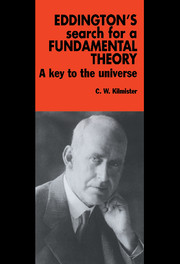
-
Select format
-
- Publisher:
- Cambridge University Press
- Publication date:
- December 2009
- January 1995
- ISBN:
- 9780511608209
- 9780521371650
- 9780521017282
- Dimensions:
- (228 x 152 mm)
- Weight & Pages:
- 0.57kg, 270 Pages
- Dimensions:
- (228 x 152 mm)
- Weight & Pages:
- 0.415kg, 272 Pages
You may already have access via personal or institutional login
Book description
Sir Arthur Eddington, the celebrated astrophysicist, made great strides towards his own 'theory of everything' in his last two books published in 1936 and 1946. Unlike his earlier lucid and authoritative works, these are strangely tentative and obscure - as if he were nervous of the significant advances that he might be making. This 1995 volume examines both how Eddington came to write these uncharacteristic books - in the context of the physics and history of the day - and what value they have to modern physics. The result is an illuminating description of the development of theoretical physics, in the first half of the twentieth century, from a unique point of view: how it affected Eddington's thought. This will provide fascinating reading for scholars in the philosophy of science, theoretical physics, applied mathematics and the history of science.
Reviews
‘No-one is better qualified to penetrate Eddington’s thoughts than Clive Kilmister … Kilmister’s strength lies clearly in his profound physical and mathematical understanding of Eddington’s theories.’
Helge Kragh Source: Centaurus
‘ … a valuable addition to the literature.’
Source: The Times Higher Education Supplement
Contents
Metrics
Altmetric attention score
Full text views
Full text views help Loading metrics...
Loading metrics...
* Views captured on Cambridge Core between #date#. This data will be updated every 24 hours.
Usage data cannot currently be displayed.
Accessibility standard: Unknown
Why this information is here
This section outlines the accessibility features of this content - including support for screen readers, full keyboard navigation and high-contrast display options. This may not be relevant for you.
Accessibility Information
Accessibility compliance for the PDF of this book is currently unknown and may be updated in the future.


